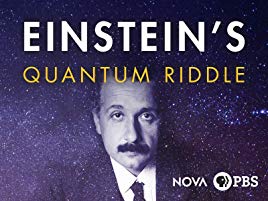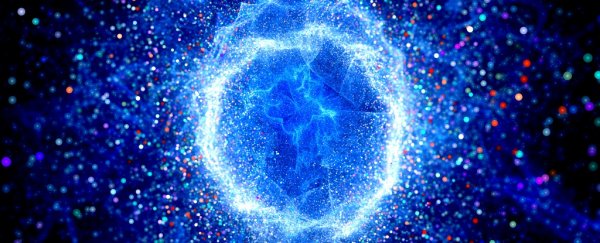What Was God Thinking?
As I get older and hopefully wiser, I find myself realizing how much drama and excitement there is in the real world, as opposed to my younger mentality where I thought that reality was boring and that the worlds of imaginations were far more interesting. Yet as I learn more about the world that God has made as an expression of His glory, I also learn how much of it truly sounds like fantasy.
 I’ve been an armchair theoretical physics fan for a couple of decades now. My favorite book on the subject is Dr. Michio Kaku’s romp through hyperspace, appropriately titled Hyperspace (and I will never get tired of telling anyone who will listen that Dr. Kaku once called my house when I was sixteen to interview me for his radio show after I had emailed my praises for his futuristic tome Visions). String theory, ten dimensions, wormholes, particles and waves – all that stuff really excited me as a teenager. Still does, though not with the same giddiness. These days, it’s more of, “Man, isn’t God amazing?”
I’ve been an armchair theoretical physics fan for a couple of decades now. My favorite book on the subject is Dr. Michio Kaku’s romp through hyperspace, appropriately titled Hyperspace (and I will never get tired of telling anyone who will listen that Dr. Kaku once called my house when I was sixteen to interview me for his radio show after I had emailed my praises for his futuristic tome Visions). String theory, ten dimensions, wormholes, particles and waves – all that stuff really excited me as a teenager. Still does, though not with the same giddiness. These days, it’s more of, “Man, isn’t God amazing?”
One quiet evening, I was perusing the titles on Amazon Prime and came across an episode of Nova called Einstein’s Quantum Riddle and I gave it a go. The program details the discovery of quantum physics and Einstein’s refusal to acknowledge “quantum entanglement,” which essentially means that two particles can somehow be linked across the expanse of space and act and react at the same time despite their vast separation. It sounds ridiculous at first but the math is solid, and later experiments showed it to indeed be a legitimate phenomenon. Scientists are still baffled as to how this could actually take place but it does, and this is leading to breakthroughs in quantum computing that exceed our wildest imaginations.
As I was watching the program, I found myself shaking my head along with Einstein. How can particles be linked across space like that? Relativity shows that nothing can travel faster than light, so how could a signal from one particle to another traverse astronomical distances instantaneously? One scientist put it simply, “Perhaps there is no such thing as space.” For weeks I’ve been trying to wrap my head around that, and I’m still reeling.
We humans, as rational beings, want everything to make sense. Einstein had his world-changing theory of relativity show very beautifully how time and space interact, and then quantum physics came along and caused major disruptions, much to his consternation. There have been numerous attempts to reconcile quantum physics and relativity, with string theory being the closest candidate, but the “Theory of Everything” remains elusive. I wish general and special relativity explained everything because it would feel so nice and satisfying, or if quantum physics was the blueprint for the entire universe, but we also know that relativity is still in play. It’s frustrating that such “nonsense” winds up being true.
Yet through all the upheavals and discoveries and brick walls, God’s glory is magnified, not diminished. There is a tendency for academics and scientists to think, “The more I know, the smaller God becomes,” when in fact it should be the opposite. Even Albert Einstein, a pantheist with a very shaky concept of God, said about quantum mechanics: “The theory yields much, but it hardly brings us closer to the Old One’s secrets.” The more we learn, the more in awe we should be of God’s power and creativity. And while it may cause much frustration and anguish for the brilliant minds here on Earth, it it more than worth the chase.





































AAAAAAnd now I’ve gone down the rabbit trail of reading articles on quantum computing and my brain hurts.
We want everything to make sense. It does–but not always to us.
Our human understandings are very limited. Yet we continue to overestimate them.
As Alexander Pope said, “Though man’s a fool, yet God is wise.”
Mark, I’m also a big fan of reading books about physics. I think Roger Penrose is my favorite mathematician/scientist, but I’m super impressed you actually had a conversation with Michio Kaku once upon a time.
If you do a cross comparison with the book of Job, one of the things God did was spend time presenting to Job how little Job understood the universe. The point of which was to bring Job to the point of admitting he didn’t know all the things he thought he knew.
Though the mysteries have changed in many ways since then the very nature of the mysteriousness of the universe points to the power and glory of God. Even as science learns more and more, the human race still has a massive measure of mystery facing us concerning the nature of reality, pointing out God’s power and greatness.
And it is fascinating to me that atheists often act as if the universe is more and more solved, that we are virtually just around the corner to solving it, when since the early 1900s physics has had two basic theories, General Relativity and Quantum Mechanics, which both must be true, but which describe the universe in ways that are essentially incompatible with one another. Science is in the middle of a giant clash of ideas that’s been going on for more than a century now and nobody has solved it, the efforts of Dr. Kaku and Dr. Penrose and others notwithstanding.
Yet atheists act as if the universe is pretty much figured out–that if we assign to God those things we cannot explain (some people call this “the God of the gaps”) then the “gaps” God occupies are getting increasingly smaller. Which isn’t true at all! The number of things human science realizes it doesn’t understand is significantly higher now than in 1900, in spite of many real advances in knowledge and especially in technology since then.
Interesting article. Thanks for sharing!